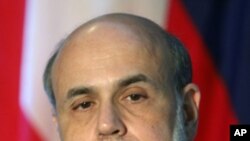The chairman of the U.S. central bank says economic and fiscal ruin would result from a failure by Congress to raise the limit on the federal government's ability to borrow money and service America's national debt.
For years, Federal Reserve Chairman Ben Bernanke has warned of the dangers of failing to confront fiscal challenges and meet fiscal responsibilities. Perhaps his most-pointed comments to date came Tuesday in describing the perils of delay in raising the federal debt limit, which could cause the U.S. government to default on its obligations to lenders.
“Even a short suspension of payments on principal or interest on the Treasury’s debt obligations would cause severe disruptions in financial markets, induce ratings downgrades of U.S. government debt, create fundamental doubts about the credit worthiness of the United States, and damage the special role of the [U.S.] dollar and of Treasury securities in global markets," said Bernanke. "Interest rates would likely rise, slowing the recovery and, perversely, worsening the deficit problem.”
Bernanke spoke at a Washington conference on America’s debt crisis sponsored by the bipartisan public policy group, the Committee for a Responsible Federal Budget. The Federal Reserve chairman admitted that no one relishes the idea of allowing the U.S. government to borrow additional money when the national debt already exceeds $14 trillion. But he noted that additional funds are needed to cover fiscal commitments already made by Republican and Democratically-controlled Congresses and administrations alike.
The United States is bumping up against the current federal borrowing limit of $14.2 trillion. President Barack Obama and Democrats on Capitol Hill have urged a prompt raising of the debt ceiling as a painful but necessary step. But many Republican legislators are either accusing Democrats of hyping the potential dangers of default, or insisting that federal spending be cut as a condition for a debt ceiling vote.
Also appearing at the debt conference was House Budget Committee Chairman Paul Ryan, who portrayed the issue as one of the few tools available to Republicans to pressure what he sees as spendthrift Democrats in the Senate and the White House.
“Unfortunately, our partners in the Senate have chosen not to do a budget," said Ryan. "We [House Republicans] have put our plan out there, but the budget process is done. And that is why the debt limit is the only other train in the station left to get any kind of fiscal controls out of Congress, and that is why you have these talks revolving around the debt limit.”
Many participants at the debt conference stressed that both political parties bear responsibility for America’s fiscal woes. Democratic Senator Mark Warner of Virginia said he cannot believe that anyone of either party would even consider allowing the United States to default on its debt obligations.
“I do not know what economic bible they look at when the United States defaults, that somehow that could be a good proposition. When right now the market has already priced the chance of our default as higher than the chance of Mexico, the Philippines, Panama," said Warner. "They are better credit risks than the United States government? Everything else that we talk about in Washington pales in comparison to this issue.”
Warner is part of a bipartisan group of senators working to bridge differences on trimming the federal deficit and reducing the country’s debt burden. Another member of the group, Republican Senator Mike Crapo of Idaho, noted that raising the debt ceiling is but the first step of a longer march to fiscal sanity.
“I do believe we will get to a deal on the debt ceiling at some point, and it will not be pretty when it happens," said Crapo. "But when it is over, we will still have a debt crisis in America. And we will still need to be putting together a major paradigm shift in America to help us get onto a right path.”
In general, Democrats favor modest spending restraint and higher federal taxes on the wealthy to improve America’s fiscal balance. Republicans reject tax hikes and insist on deep spending cuts, along with transforming programs that provide income and medical coverage for retirees. Many economists believe both lower government spending and higher tax revenues will be needed to bridge the nation’s budget gap and, ultimately, trim the national debt. But a bipartisan formula for doing so remains elusive.
In the meantime, America skates closer to a potential debt default with each passing day.
US Central Bank Chief: Debt Ceiling Must be Raised




